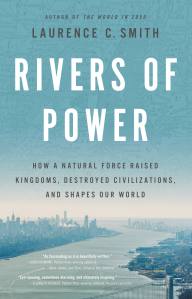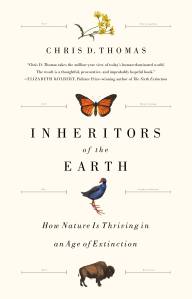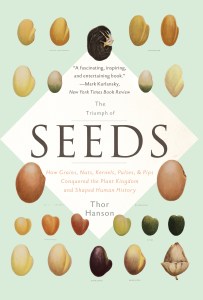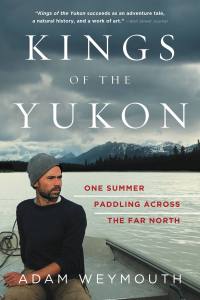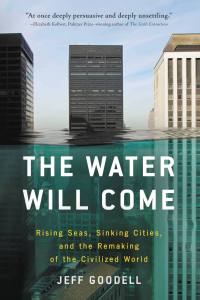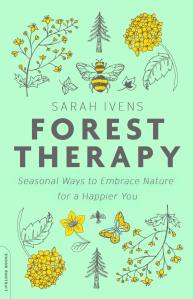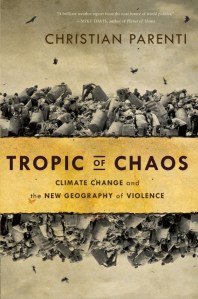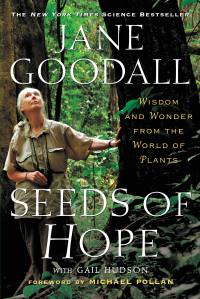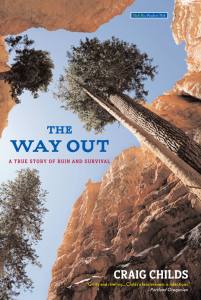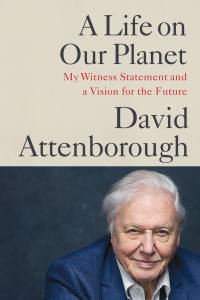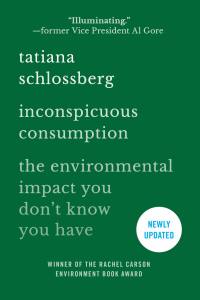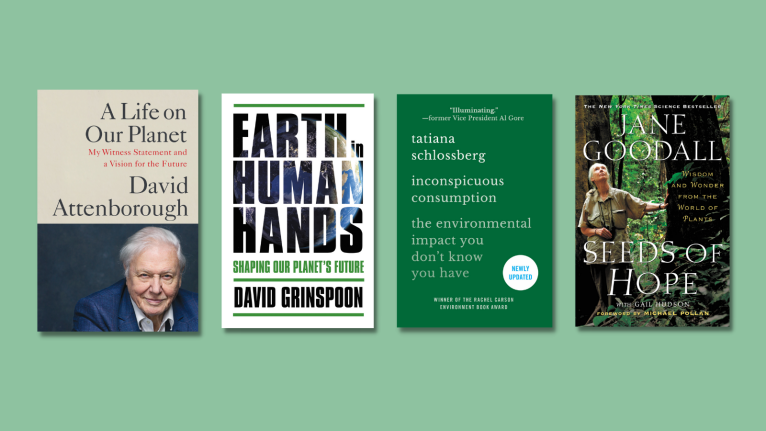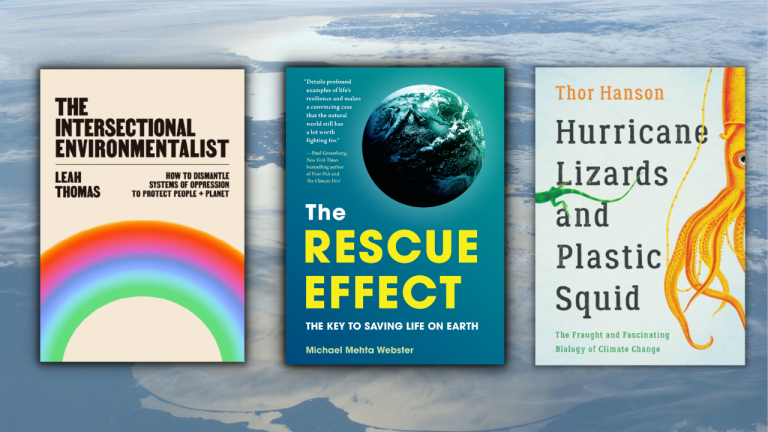Enlightening Earth Day Reads
Celebrate Earth Day by learning about the impact that humans have had on the world and how we can all come together to create a better future.
Rivers, more than any road, technology, or political leader, have shaped the course of human civilization. They have opened frontiers, founded cities, settled borders, and fed billions. They promote life, forge peace, grant power, and can capriciously destroy everything in their path. Even today, rivers remain a powerful global force -- one that is more critical than ever to our future.
In Rivers of Power, geographer Laurence C. Smith explores the timeless yet underappreciated relationship between rivers and civilization as we know it. Rivers are of course important in many practical ways (water supply, transportation, sanitation, etc). But the full breadth of their influence on the way we live is less obvious. Rivers define and transcend international borders, forcing cooperation between nations. Huge volumes of river water are used to produce energy, raw commodities, and food. Wars, politics, and demography are transformed by their devastating floods. The territorial claims of nations, their cultural and economic ties to each other, and the migrations and histories of their peoples trace back to rivers, river valleys, and the topographic divides they carve upon the world. And as climate change, technology, and cities transform our relationship with nature, new opportunities are arising to protect the waters that sustain us.
Beautifully told and expansive in scope, Rivers of Power reveals how and why rivers have so profoundly influenced our civilization and examines the importance this vast, arterial power holds for the future of humanity.
"As fascinating as it is beautifully written."---Jared Diamond, Pulitzer Prize-winning author of Guns, Germs, and Steel, Collapse, and Upheaval
It's accepted wisdom today that human beings have permanently damaged the natural world, causing extinction, deforestation, pollution, and of course climate change. But in Inheritors of the Earth, biologist Chris Thomas shows that this obscures a more hopeful truth -- we're also helping nature grow and change. Human cities and mass agriculture have created new places for enterprising animals and plants to live, and our activities have stimulated evolutionary change in virtually every population of living species. Most remarkably, Thomas shows, humans may well have raised the rate at which new species are formed to the highest level in the history of our planet.
Drawing on the success stories of diverse species, from the ochre-colored comma butterfly to the New Zealand pukeko, Thomas overturns the accepted story of declining biodiversity on Earth. In so doing, he questions why we resist new forms of life, and why we see ourselves as unnatural. Ultimately, he suggests that if life on Earth can recover from the asteroid that killed off the dinosaurs, it can survive the onslaughts of the technological age. This eye-opening book is a profound reexamination of the relationship between humanity and the natural world.
"The genius of Hanson's fascinating, inspiring, and entertaining book stems from the fact that it is not about how all kinds of things grow from seeds; it is about the seeds themselves." -- Mark Kurlansky, New York Times Book Review
We live in a world of seeds. From our morning toast to the cotton in our clothes, they are quite literally the stuff and staff of life: supporting diets, economies, and civilizations around the globe. Just as the search for nutmeg and pepper drove the Age of Discovery, coffee beans fueled the Enlightenment and cottonseed sparked the Industrial Revolution. Seeds are fundamental objects of beauty, evolutionary wonders, and simple fascinations. Yet, despite their importance, seeds are often seen as commonplace, their extraordinary natural and human histories overlooked. Thanks to this stunning new book, they can be overlooked no more. This is a book of knowledge, adventure, and wonder, spun by an award-winning writer with both the charm of a fireside story-teller and the hard-won expertise of a field biologist. A fascinating scientific adventure, it is essential reading for anyone who loves to see a plant grow.
The Yukon river is 2,000 miles long, the longest stretch of free-flowing river in the United States. In this riveting examination of one of the last wild places on earth, Adam Weymouth canoes along the river's length, from Canada's Yukon Territory, through Alaska, to the Bering Sea. The result is a book that shows how even the most remote wilderness is affected by the same forces reshaping the rest of the planet.
Every summer, hundreds of thousands of king salmon migrate the distance of the Yukon to their spawning grounds, where they breed and die, in what is the longest salmon run in the world. For the communities that live along the river, salmon was once the lifeblood of the economy and local culture. But climate change and a globalized economy have fundamentally altered the balance between man and nature; the health and numbers of king salmon are in question, as is the fate of the communities that depend on them.
Traveling along the Yukon as the salmon migrate, a four-month journey through untrammeled landscape, Adam Weymouth traces the fundamental interconnectedness of people and fish through searing and unforgettable portraits of the individuals he encounters. He offers a powerful, nuanced glimpse into indigenous cultures, and into our ever-complicated relationship with the natural world. Weaving in the rich history of salmon across time as well as the science behind their mysterious life cycle, Kings of the Yukon is extraordinary adventure and nature writing at its most urgent and poetic.
"Kings of the Yukon succeeds as an adventure tale, a natural history and a work of art."-Wall Street Journal
What if Atlantis wasn't a myth, but an early precursor to a new age of great flooding? Across the globe, scientists and civilians alike are noticing rapidly rising sea levels, and higher and higher tides pushing more water directly into the places we live, from our most vibrant, historic cities to our last remaining traditional coastal villages. With each crack in the great ice sheets of the Arctic and Antarctica, and each tick upwards of Earth's thermometer, we are moving closer to the brink of broad disaster.
By century's end, hundreds of millions of people will be retreating from the world's shores as our coasts become inundated and our landscapes transformed. From island nations to the world's major cities, coastal regions will disappear. Engineering projects to hold back the water are bold and may buy some time. Yet despite international efforts and tireless research, there is no permanent solution-no barriers to erect or walls to build-that will protect us in the end from the drowning of the world as we know it.
The Water Will Come is the definitive account of the coming water, why and how this will happen, and what it will all mean. As he travels across twelve countries and reports from the front lines, acclaimed journalist Jeff Goodell employs fact, science, and first-person, on-the-ground journalism to show vivid scenes from what already is becoming a water world.
“An immersive, mildly gonzo and depressingly well-timed book about the drenching effects of global warming, and a powerful reminder that we can bury our heads in the sand about climate change for only so long before the sand itself disappears.” —Jennifer Senior, New York Times
Research shows that spending time outside can improve your immune system, combat stress hormones, lower blood pressure, and boost self-esteem. Yet everyday life prevents us from connecting with the outdoors. Forest Therapy shares why getting back to nature is critically important for our well-being, and offers fun, easy practices to break out of hibernation.
Addressing all four seasons, Forest Therapy offers inspiration for utilizing the power of nature to deepen your relationships with family, friends, and, most importantly, yourself. From a simple walk in the woods to DIY natural beauty products, this charming, illustrated guide will help improve your health and happiness–so you can live your best life out in the open air.
In Tropic of Chaos, investigative journalist Christian Parenti travels along the front lines of this gathering catastrophe--the belt of economically and politically battered postcolonial nations and war zones girding the planet's midlatitudes. Here he finds failed states amid climatic disasters. But he also reveals the unsettling presence of Western military forces and explains how they see an opportunity in the crisis to prepare for open-ended global counterinsurgency.
Parenti argues that this incipient "climate fascism" -- a political hardening of wealthy states-- is bound to fail. The struggling states of the developing world cannot be allowed to collapse, as they will take other nations down as well. Instead, we must work to meet the challenge of climate-driven violence with a very different set of sustainable economic and development policies.
Seeds of Hope takes us from Goodall's home in England to her home-away-from-home in Africa, deep inside the Gombe forest, where she and the chimpanzees are enchanted by the fig and plum trees they encounter. She introduces us to botanists around the world, as well as places where hope for plants can be found, such as The Millennium Seed Bank. She shows us the secret world of plants with all their mysteries and potential for healing our bodies as well as Planet Earth.
Looking at the world as an adventurer, scientist, and devotee of sustainable foods and gardening—and setting forth simple goals we can all take to protect the plants around us—Goodall delivers an enlightening story of the wonders we can find in our own backyards.
Are you prepared for a perilous journey into the wild?
This taut, intensely dramatic narrative immerses us in a labyrinth of canyons in the American Southwest where virtually nothing is alive — barely any vegetation, few signs of wildlife, and scant traces of any human precursors — and where we pay witness as two men confront not just immutable forces of nature but the limits of their own sanity. As a chronicle of adventure, as an emotionally charged human drama, as a confessional memoir, The Way Out is a transcendent book, a work destined to earn a lasting place in the literature of extremes.
In this scientifically informed account of the changes occurring in the world over the last century, award-winning broadcaster and natural historian shares a lifetime of wisdom and a hopeful vision for the future.
I am 93. I've had an extraordinary life. It's only now that I appreciate how extraordinary.
As a young man, I felt I was out there in the wild, experiencing the untouched natural world - but it was an illusion. The tragedy of our time has been happening all around us, barely noticeable from day to day -- the loss of our planet's wild places, its biodiversity.
I have been witness to this decline. A Life on Our Planet is my witness statement, and my vision for the future. It is the story of how we came to make this, our greatest mistake -- and how, if we act now, we can yet put it right.
We have one final chance to create the perfect home for ourselves and restore the wonderful world we inherited.
All we need is the will to do so.
"If you're looking for something to cling to in what often feels like a hopeless conversation, Schlossberg's darkly humorous, knowledge-is-power, eyes-wide-open approach may be just the thing."--Vogue
From a former New York Times science writer, this urgent call to action will empower you to stand up to climate change and environmental pollution by making simple but impactful everyday choices.
With urgency and wit, Tatiana Schlossberg explains that far from being only a distant problem of the natural world created by the fossil fuel industry, climate change is all around us, all the time, lurking everywhere in our convenience-driven society, all without our realizing it.
By examining the unseen and unconscious environmental impacts in four areas-the Internet and technology, food, fashion, and fuel - Schlossberg helps readers better understand why climate change is such a complicated issue, and how it connects all of us: How streaming a movie on Netflix in New York burns coal in Virginia; how eating a hamburger in California might contribute to pollution in the Gulf of Mexico; how buying an inexpensive cashmere sweater in Chicago expands the Mongolian desert; how destroying forests from North Carolina is necessary to generate electricity in England.
Cataloging the complexities and frustrations of our carbon-intensive society with a dry sense of humor, Schlossberg makes the climate crisis and its solutions interesting and relevant to everyone who cares, even a little, about the planet. She empowers readers to think about their stuff and the environment in a new way, helping them make more informed choices when it comes to the future of our world.
Most importantly, this is a book about the power we have as voters and consumers to make sure that the fight against climate change includes all of us and all of our stuff, not just industry groups and politicians. If we have any hope of solving the problem, we all have to do it together.
"A compelling-and illuminating-look at how our daily habits impact the environment."--Vanity Fair
"Shows how even the smallest decisions can have profound environmental consequences."--The New York Times
What to Read Next
By clicking ‘Sign Up,’ I acknowledge that I have read and agree to Hachette Book Group’s Privacy Policy and Terms of Use
